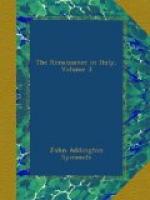Michael Angelo’s poems, even after his grand-nephew had tried to reduce them to lucidity and order, have always been considered obscure and crabbed. Nor can it be pretended that they gain in smoothness and clearness by the restoration of the true readings. On the contrary, instances of defective grammar, harsh elisions, strained metaphors, and incomplete expressions are multiplied. The difficulty of comprehending the sense is rather increased than diminished, and the obstacles to a translator become still more insurmountable than Wordsworth found them.[413] This being undoubtedly the case, the value of Guasti’s edition for students of Michael Angelo is nevertheless inestimable. We read now for the first time what the greatest man of the sixteenth century actually wrote, and are able to enter, without the interference of a fictitious veil, into the shrine of his own thought and feeling. His sonnets form the best commentary on Michael Angelo’s solitary life and on his sublime ideal of art. This reflection has guided me in the choice of those now offered in English, as an illustration of the chapter in this volume devoted to their author’s biography.
Though the dates of Michael Angelo’s compositions are conjectural, it may be assumed that the two sonnets on Dante were written when he was himself in exile. We know that, while sojourning in the house of Gian Francesco Aldovrandini at Bologna, he used to spend a portion of his time in reading Dante aloud to his protector;[414] and the indignation expressed against Florence, then as ever fickle and ungrateful, the gente avara, invidiosa, e superba, to use Dante’s own words, seems proper to a period of just resentment. Still there is no certainty that they belong to 1495; for throughout his long life Michael Angelo was occupied with Dante. A story told of him in 1506, together with the dialogues reported by Donato Giannotti, prove that he was regarded by his fellow-citizens as an authority upon the meaning of the “Divine Comedy."[415] In 1518, when the Florentine Academy petitioned Leo X. to transport the bones of Dante from Ravenna to Florence, Michael Angelo subscribed the document and offered to erect a statue worthy of the poet.[416] How deeply the study of Dante influenced his art, appears not only in the lower part of the “Last Judgment:” we feel that source of stern and lofty inspiration in his style at large; nor can we reckon what the world lost when his volume of drawings in illustration of the “Divine Comedy” perished at sea.[417] The two following sonnets, therefore, whenever written, may be taken as expressing his settled feeling about the first and greatest of Italian poets:[418]—
DAL CIEL DISCESE
From heaven his spirit came,
and robed in clay
The realms of
justice and of mercy trod,
Then rose a living
man to gaze on God,
That he might make the truth
as clear as day.
For that pure star that brightened
with his ray
The ill-deserving
nest where I was born,
The whole wide
world would be a prize to scorn;
None but his Maker can due
guerdon pay.




